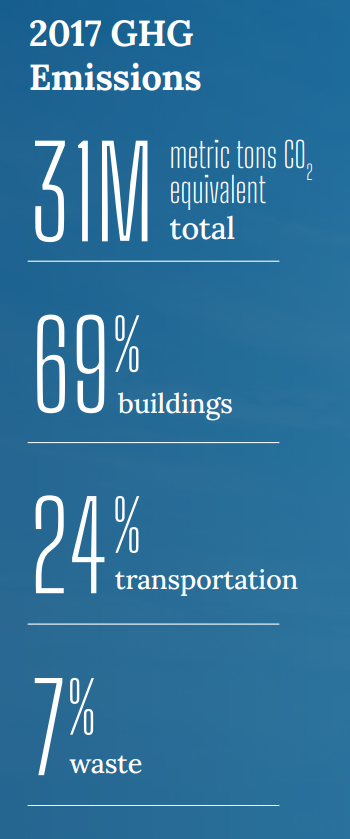Electrify Chicago
An independent tool for viewing City of Chicago building data
According to the
2022 Chicago Climate Action Plan,
69% of Chicago's emissions come from buildings, making
building emissions our biggest challenge and our biggest opportunity as a city
to tackle climate change. At Electrify Chicago, we showcase building performance using
publicly available data supplemented by community-submitted photographs and building
owners.
Start by looking at Chicago's buildings with the highest greenhouse gas intensity i.e. emissions per square foot. Large, efficient, buildings can perform much better than very inefficient small buildings on this metric.
New Article
📰 $30 Million In Missed Fines
The City Of Chicago failed to collect $30 million in potential fines from the building benchmarking ordinance, reducing transparency and accountability.
Legislative update! 🎉
As of late January 2024, legislation is being introduced to require new use more efficient forms of water and space heating, via the Clean And Affordable Buildings Ordinance (CABO), which will reduce the number of highly polluting and inefficient buildings that end up on this site.
If you're in Chicago,
write to your alderman to support the CABO!
Chicago Buildings by Greenhouse Gas Intensity
Note: Data includes large Chicago buildings with data from 2022, unless explicitly stated otherwise.
Note: This data only includes buildings whose emissions are reported
under the
Chicago Energy Benchmarking Ordinance. According to the City “As of 2016,
this list includes all commercial, institutional, and residential buildings larger than
50,000 square feet.” This dataset is also then filtered to only buildings with
reported emissions > 1,000 metric tons CO2 equivalent.
The latest year of data is from 2022, but we update the site regularly when new data is available, and some buildings may have failed to report that year, and only have older data available.
| Property Name / address | Primary Property Type |
Greenhouse Gas Intensity (kg CO2 eq./sqft) |
Total Greenhouse Emissions (metric tons CO2 eq.) |
|---|---|---|---|
|
531 535 W DEMING PL
531 535 W DEMING PL
| Multifamily Housing | 5.7 kg/sqft
Lowest 37%
| 374 tons
Lowest 14%
|
|
1548 1558 W JUNEWAY TER
🕰️
1548 1558 W JUNEWAY TER
| Multifamily Housing | 5.7 kg/sqft | 337 tons |
|
5439 5443 N KENMORE AVE
5439 5443 N KENMORE AVE
| Multifamily Housing | 5.7 kg/sqft
Lowest 37%
| 298 tons
Lowest 8%
|
|
6150 N KENMORE AVE
6150 N KENMORE AVE
| Multifamily Housing | 5.7 kg/sqft
Lowest 37%
| 419 tons
Lowest 18%
|
|
Wrigley Building
410 N MICHIGAN AVE
| Office | 5.7 kg/sqft
Lowest 37%
| 3,759 tons
Highest 10%
|
|
550 W Washington
550 W Washington
| Office | 5.7 kg/sqft
Lowest 37%
| 2,228 tons
Highest 20%
|
|
Michael A. Bilandic Building
160 N LaSalle St
| Office | 5.7 kg/sqft
Lowest 37%
| 2,661 tons
Highest 16%
|
|
One South Dearborn
1 S Dearborn
| Office | 5.7 kg/sqft
Lowest 37%
| 5,417 tons
Highest 6%
|
|
7131 7143 S YATES BLVD
7131 7143 S YATES BLVD
| Multifamily Housing | 5.7 kg/sqft
Lowest 37%
| 399 tons
Lowest 17%
|
|
1900 1910 W FARWELL AVE
1900 1910 W FARWELL AVE
| Multifamily Housing | 5.7 kg/sqft
Lowest 37%
| 336 tons
Lowest 11%
|
|
Lindblom College Prep -CPS
(CPS)
6130 S Wolcott Ave
| K-12 School | 5.7 kg/sqft
Lowest 37%
| 1,742 tons
Highest 27%
|
|
Schiff Residences
1244 North Clybourn
| Multifamily Housing | 5.6 kg/sqft
Lowest 35%
| 358 tons
Lowest 13%
|
|
City Hyde Park
5105 S HARPER AVE
| Multifamily Housing | 5.6 kg/sqft
Lowest 35%
| 2,062 tons
Highest 22%
|
|
Residences at The Vic
🕰️
3140 N Sheffield Ave
| Multifamily Housing | 5.6 kg/sqft | 659 tons |
|
2007 N Sedgwick Condominium Association
2007 N Sedgwick
| Multifamily Housing | 5.6 kg/sqft
Lowest 35%
| 282 tons
Lowest 7%
|
Data Source:
Chicago Energy Benchmarking Data
